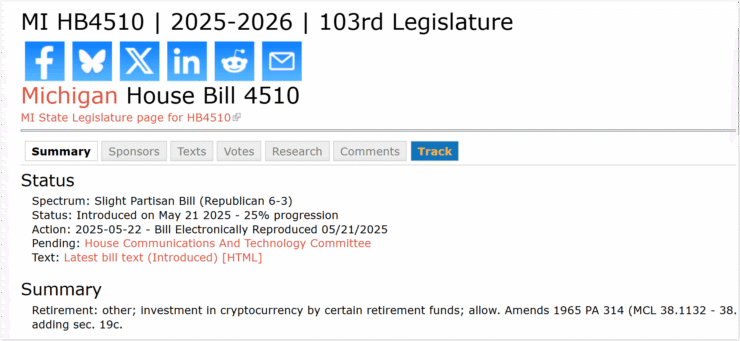Michigan legislators are making a bold push to modernize the state’s crypto framework with a new package of bills that touch nearly every aspect of digital asset policy—from pension fund investments to mining incentives and central bank digital currencies (CBDCs).
At the heart of the legislative suite is House Bill 4510, which proposes a crypto investment option for public pension funds. If passed, the bill would amend Michigan’s Public Employee Retirement System Investment Act, allowing the state treasurer to allocate retirement funds into cryptocurrencies—but only if the digital assets maintain a $250 billion market cap for 12 months.

Importantly, all such investments must be made through regulated exchange-traded products, ensuring institutional safeguards and minimizing exposure to unregulated markets.
This proposal builds on earlier momentum. In February 2025, Michigan lawmakers began exploring limited crypto exposure for general treasury funds—part of a broader movement among U.S. states reacting to a friendlier federal policy landscape.
New Bills Address CBDCs, Mining, and Tax Clarity
Beyond pension investments, Michigan’s new crypto legislation outlines a firm position on digital sovereignty and environmental innovation.
House Bill 4511 stakes a political and legal position against central bank digital currencies, explicitly banning state agencies or officials from promoting a U.S. CBDC. The bill also seeks to protect citizens’ rights to hold and use crypto, limiting state intervention and licensing mandates.
Meanwhile, House Bill 4512 proposes a Bitcoin mining initiative at abandoned oil wells, encouraging private firms to participate in state-backed programs—if they commit to environmental restoration of the sites used.
House Bill 4513 complements the mining effort by amending the state tax code, offering clarity on income derived from crypto mining operations. Together, these bills show Michigan’s intent to become a national leader in clean, regulated digital asset innovation.
Michigan Already Holds Crypto ETFs in Pension Funds
While the legislation is new, Michigan’s crypto involvement is not. As of June 2024, the State of Michigan Retirement Agency disclosed $6.6 million in ARKB, a spot Bitcoin ETF. By November, that exposure grew to include over $10 million in an Ethereum ETF.
Michigan joins a rising number of U.S. states building direct crypto exposure into public finances. New Hampshire and Arizona passed legislation last year creating state-level Bitcoin reserves, and Texas lawmakers are weighing similar proposals.
These trends mirror federal developments. In March 2025, President Donald Trump signed an executive order to create a U.S. strategic Bitcoin reserve, marking the first official government-level recognition of Bitcoin as a macroeconomic tool.
Quick Facts
- Michigan introduced four new crypto bills on May 22, 2025.
- HB 4510 allows crypto ETF exposure for public pensions.
- HB 4511 bans state promotion of a U.S. CBDC.
- HB 4512 & 4513 focus on Bitcoin mining and tax reform.
- Michigan currently holds BTC and ETH ETFs in retirement funds.





